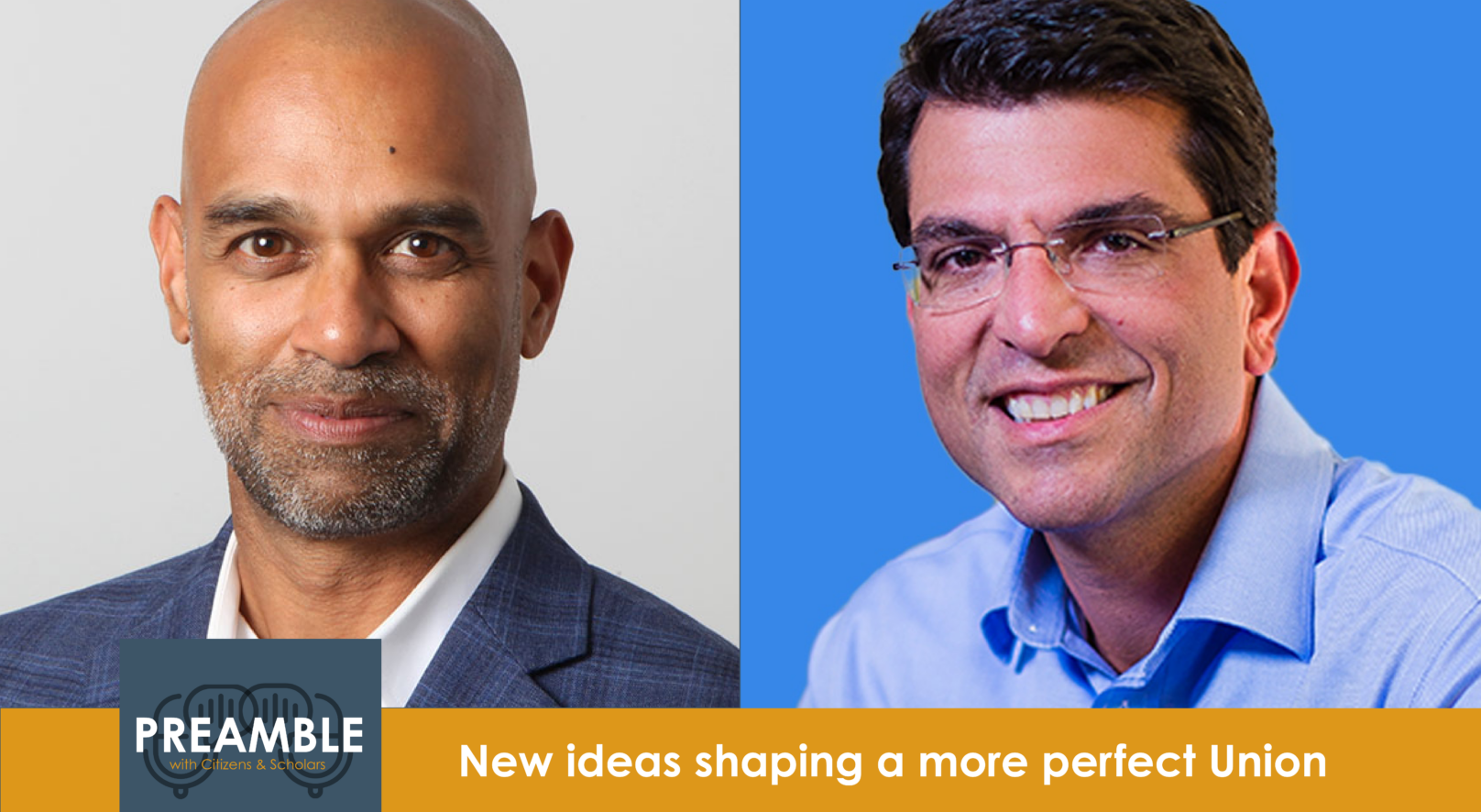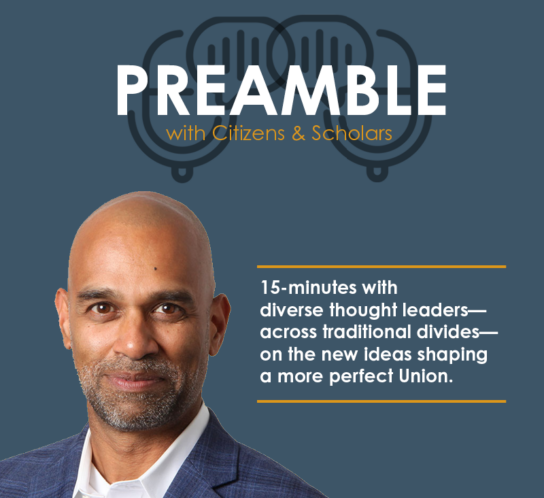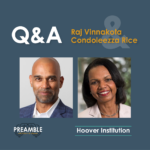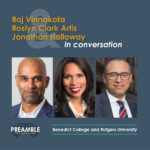Preamble: Jason Grumet
March 6, 2023
Share

In this urgent moment for the nation, we can strengthen democracy—together. In Preamble, Citizens & Scholars president Raj Vinnakota sits down for 15-minute conversations with diverse thought leaders—across traditional divides—on the new ideas shaping a more perfect Union.
Here, Raj sits down with Jason Grumet, co-founder and former president of the Bipartisan Policy Center and CEO of the American Clean Power Association. Below is an edited excerpt from the conversation.
Rajiv Vinnakota: Can you tell me what motivated you to start the Bipartisan Policy Center?
Jason Grumet: One thing that I did in college was extemporaneous debate.
And the beauty of that is recognizing that there’s always a different point of view that you can embody yourself if forced to. And that, if one idea’s going this way, you don’t have to come right at it. There’s always a different place to land.
I remember Howard Baker, who’s one of our co-founders, said that he met a lot of people in the world who were 80% wrong, which is really, really, really wrong. But he’d never met anybody who was 100% wrong. I’m always looking for those little embers.
And then I stumbled into a job working for the Northeast Governors when they just happened to be a bipartisan group back in the late 80s, early 90s, working on energy and air quality issues. And I recognized that there is a certain exhilaration and power in collaboration, which was something a lot of people don’t see.
RV: How has that remained constant, or not, over your time in leadership?
Jason Grumet: It’s actually been much more consistent than I think most people imagine.
So this last year (2022), despite how incredibly toxic, it was probably the most productive legislative year in the last decade. It was also, oddly, the most partisan/bipartisan year. There was the reconciliation process, which is, by definition, designed to be partisan. And at the same time, they passed a couple dozen significant pieces of bipartisan legislation.
There was the Infrastructure Bill, the CHIPS Act against China, and the PACT Act, which protects veterans. Then things that sound boring, like postal reform, which matters if you like to get mail. And the Gun Bill, the Violence Against Women’s Act, and the Respect for Marriage Act. They passed all these laws.
If you’re going to be optimistic about it, you will say that they rediscovered this capacity to metabolize the aggression that is inherent in any free, pluralistic democracy. They fight sometimes and work together other times.
If you’re less optimistic, the Republicans just never thought the Democrats could get the reconciliation thing passed, so they were willing to collaborate a little bit along the way.
Watch the Full Conversation
Raj and Jason sit down to talk about the power of bipartisan work and what is working for the U.S. government.
The other thing to note is elections. For about 15 years I’ve been talking about this fundamental ballast, it’s a superpower in American democracy. When we get really close to the edge, it would pull us back. I will note Tocqueville describes it as repairable mistakes. Not that we are prettier or smarter or better, but that this country, this culture, had this capacity to make repairable mistakes.
And in the last few years I talked about it a lot more, with great vigor, while I started to believe it less and less. And the 2022 midterm election was a pretty great thing, because it suggests that when it gets scary, maybe there is that core premise.
I think we were afraid that there’d be 100 people challenging election results, that the basic fabric of democracy could be cast into doubt. And it just didn’t happen.
These two things make me feel like there is a through line that we can’t take for granted.
RV: There was a major report that came out in 2019 by More in Common that identified that roughly 65-70% of our country was what was then defined as the exhausted majority. It’s that group of people who did want to see work happening across whatever spans there were and wanted to get things done. Do you see that group as a constituency? Does that ever coalesce in any way or form that you see?
Jason Grumet: Not so much. I think we see people answer those polling questions, and then we’ll ask other questions. What do you think about a Democratic plan to do blank? And it will be dramatically supported by Democrats and opposed by Republicans. And then you say, what do you think about a Republican plan to do the exact same thing, and it just flips.
I think we want our better angels. But when it comes to actually putting the work in to choose them, it’s not easy.
But there’s another theory of the case. I mentioned that there were about 20 major bipartisan activities in these last two years. What’s more interesting than the number is that 70 members of the US Senate played a leading role in one or more of those initiatives.
We have a high bar for a leading role. Those 70 were part of the original group that came together and took the political heat to say, “We can put a deal together.” They were an original co-sponsor of the legislation, or they were the chair or ranking member of the committee that passed a bipartisan bill.
There are not 70 constructive moderates in the United States Senate. And we have seen this graphic which shows that the parties have no ideological overlap anymore, which people misconstrue to say they can’t do anything. But we are more complicated than our ideological mean.
So, if you do the work, you can find partisans who are willing to work together. I think that is a more realistic story going forward than imagining there’s this moderate base that’s going to find itself in a political space.
if you do the work, you can find partisans who are willing to work together. I think that is a more realistic story going forward than imagining there’s this moderate base that’s going to find itself in a political space.

RV: The Bipartisan Policy Center says that it prioritizes one thing above all others, which is getting things done. What are the next things that are going to get done?
Jason Grumet: We like to say we have the fierce urgency of pragmatism as a guiding principle. That most revolutions, if you look at them carefully, were evolutions.
In this coming Congress, you are going to see a lot more focus on workforce and this question of why women are not moving into the workforce in the same numbers that they have been. And that’s going to bring back questions that were substantively supported by both parties until reconciliation polarized them. Issues like childcare and paid family leave, which, again, before reconciliation had a strong bipartisan basis.
One of the challenges of the reconciliation process was a lot of the issues were good issues, but then they got basically painted as one side versus the other.
There is going to be a lot of focus on spending. We wrote some really big checks, and that is part of the reason why inflation’s so high. But there’s an incredible imperative for the government now to implement these things.
RV: One of the great things about our country is federalism, and so we’ve been talking a lot about what happens here in town. Tell me what do you see at the state level? How is bipartisan work happening there or not?
Jason Grumet: The closer you get to ground, the more practical people are.
When you look at county executives and mayors you see a lot more collaboration out of necessity. The states are turning more like the federal government. We have definitely seen the trickle down of tribalism.

Explore More Preamble
15-minute conversations on the new ideas shaping a more perfect Union.
More EpisodesBut I think you’re also seeing states start to focus more and more on issues that you just can’t not see. The opioid crisis, that got way worse during the pandemic, that nobody noticed. The housing crisis. You have homelessness in rural and urban areas alike. I mean, I think you’re starting to see some of those fraying of just basic human needs that I think you’ll get some progress on.
RV: You said that democracy is badly bruised but not broken. What gives you optimism about democracy right now?
Jason Grumet: I come at it from two places. One is looking at issues around free expression on campus. It is not an easy thing. I have a sophomore in college, and she will affirm that you put yourself in some kind of personal jeopardy if you express an opinion that is not seen as being consistent with mostly the woke expectations. But people are fighting that.
Second, I’ll close where we started. You might not like the judges that get picked, but the courts are working. And Congress, it’s not fun to watch so much, but they’re continuing to get quite a bit done. The Executive Branch, again, is doing pretty well.
But the elections, that’s the Achilles heel.
That’s the place where, as my elections guy likes to say, the Constitution gives people legitimate power to do illegitimate things. It wasn’t designed for the loss of normal. But that’s where we’re probably most hopeful, that that system seems to be restoring itself.
Explore more Preamble
Stay Engaged
Get More News
Join our mailing list to get more news like this to your mailbox.
Support Our Work
Help us invest in the talent, ideas, and networks that will develop young people as effective, lifelong citizens.
Ways to Support Us
